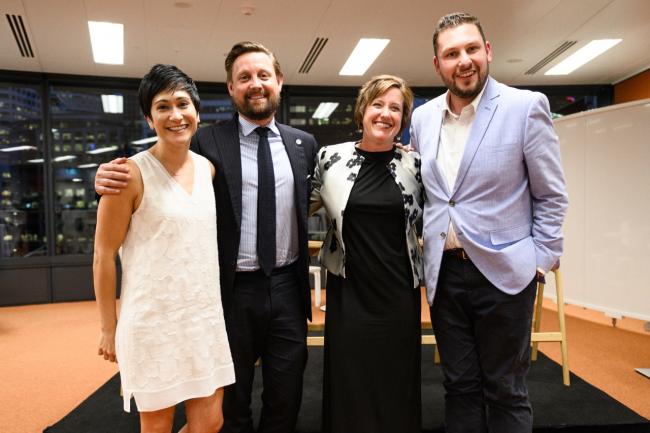WELL Movement Taking Off in Australia
SYDNEY, November 21, 2019 – Following a series of events in Melbourne and Sydney last week, the International WELL Building Institute (IWBI) highlighted Australia’s leading role in the movement to advance health and well-being in buildings and communities.
IWBI recognised a group of Australia and New Zealand-based leaders who have demonstrated outstanding achievement in advancing health and well-being for people through WELL projects and their contributions to the WELL Portfolio Advisory. Ten people, including those selected from the community of WELL Accredited Professionals (WELL APs) and WELL Faculty members, were honoured during two IWBI Australia awards celebrations hosted by IWBI President Rachel Gutter.
The 2019 IWBI leadership awards were presented to the following WELL Faculty members: Loreta Brazukas, Cundall; Ken-Yi Fong, Arup; and Sophie Hutchinson, ADP Consulting. WELL APs receiving leadership awards included Alex Kobler, WGE/Stantec, and Hayley Koerbin, NDY. Several WELL Portfolio Pilot Advisory members were also recognised, including Andrew Cole, Lendlease APPF; Danny De Sousa, Brookfield AU; Nina James, Investa; Lisa Hinde, JLL APAC; and Tony Short, Charter Hall.
“These exemplary individuals have gone above and beyond to play influential roles in advancing WELL in Australia and New Zealand,” said Rachel Gutter. “It is due to the passion and the relentless engagement of the local WELL community in delivering buildings and spaces that support people’s health and enable them to fulfil their potential, that we have been able to collectively advance the global wellness movement.”
WELL continues to advance the “second wave of sustainability” as the premier standard for buildings, interior spaces and communities seeking to implement, validate and measure features that promote human health and wellness. To date, more than 3,800 projects encompassing over 467 million square feet (nearly 4.5 million square metres) of real estate in 58 countries have been registered or certified through WELL.
Australia’s property industry has a global reputation for setting a high bar in the delivery of green buildings and communities. Expanding on the world-class outcomes promoted by Green Star around health and well-being, the country is now also embracing WELL. Australia’s 177 projects make it the third highest country in square footage, after the U.S. and China, and fourth highest in number of projects after the U.S., China and the UK.
The expanding WELL community has enthusiastically embraced the WELL movement in Australia and New Zealand. More than 230 individuals in Australia have successfully passed the WELL AP exam or are registered, highlighting the growing pool of practitioners and industry professionals looking to develop and demonstrate their understanding of strategies that put people and their health and well-being at the center of decisions about buildings and communities. Nine WELL Performance Testing Organisations servicing Australia or New Zealand now employ GBCI-trained Performance Testing Agents, bringing the ability to conduct performance verification direct to the local market and helping facilitate market transformation. In addition to the WELL Portfolio Advisory, Australians are participating in WELL Concept Advisories – a network of 100 experts reviewing the evidence and research behind WELL v2 and helping to drive what’s next within each of the 10 concepts in the WELL Building Standard.
“The industry in Australia has long demonstrated its intention to stand at the forefront of innovation in the movement to deliver better buildings that support health and sustainability,” added Gutter. “Every day we’re seeing real estate developers, owners and operators, architects, designers, sustainability consultants, human resources managers and other like-minded professionals come together to drive the rapid uptake of WELL and showcase their commitment to delivering positive environmental, social and wellness outcomes.”













